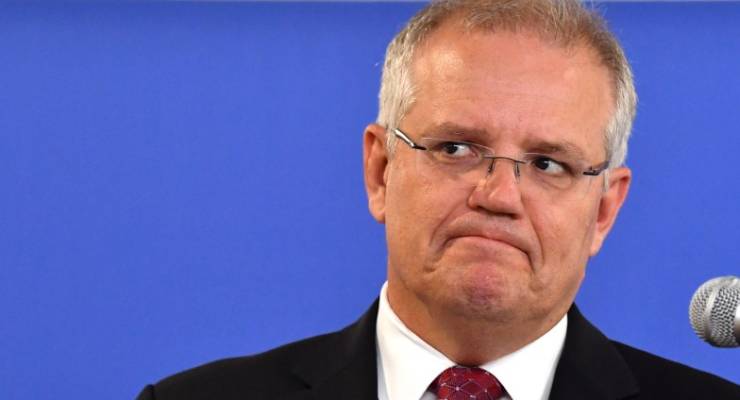
“How good is Trevor Evans?” Scott Morrison inquired, perhaps rhetorically, at the start of his “major speech” on the economy yesterday.
The goodness of Trevor Evans, the local Liberal member — sorry, a “great community based local member”, whatever that means — was enthusiastically detailed by the Prime Minister, who graced us with the anecdote of how he had “recently asked Trevor what he liked about his job. He said ‘like’s the wrong word … I love it”.”
Good one, Trev — a bon mot truly worthy of a prime ministerial lapel pin.
It was that kind of speech. From that kind of prime minister. Perhaps it’s not the media’s fault that it got so little coverage — though 7.30, commendably, had Leigh Sales quiz Morrison on aspects of it, like the 1.25 million jobs commitment — given the sheer emptiness of the speech. In fact it’s hard to recall a prime ministerial speech as hollow, as meaningless, as what Morrison offered yesterday. For all that Josh Frydenberg offered 2013-style neoliberalism in his economic speech last week, at least the Treasurer had something to say, even if it was a debauched version of Adam Smith. Frydenberg has a functioning brain. It’s not at all clear that his leader does.
The emptiness of Morrison’s speech was reflected in what he failed to mention. What are the three big issues that the government is either hopelessly divided on or ideologically incapable of grasping (or both)? Climate change, energy policy and wage stagnation. What three big issues were completely absent from a “major speech” on the economy by the nation’s leader? You guessed them.
Climate change was totally absent — not mentioned even in passing. It’s like when Tony Abbott became prime minister and all mention of climate change had to be extirpated from any government document of any kind. There was one — one — passing mention by Morrison of energy, supposedly the issue on which the government was going to differentiate itself from Labor and win the election (how very 2017 that now seems). That absence might reflect that the government literally has no energy policy, and doesn’t really have an energy minister, given Angus Taylor appears to work from a witness protection program. And wages? One mention: “by focusing on delivering a strong economy we create the right environment for wages growth”.
There’s your wages growth policy, workers. Just hang in there and eventually the economy will deliver. Like we’ve been promised for years now.
What Morrison did talk about, almost to the exclusion of everything else, was an attempt to link economic management to delivering jobs and health services to Australians. Jobs, the economy and health are of course the three big issues that voters say influence how they vote. And clearly Morrison’s staff have been obsessing over ways to address the widespread voter perception that the economy, and politics more broadly, serves only the interests of elites and corporations, and not themselves.
Here’s the link, Morrison was saying over and over: we can pay for medicines and provide jobs courtesy of our brilliant economic management, unlike that awful Bill Shorten — and we can do it without raising taxes (well, except for that thumping two percentage points of GDP more that the Liberals are taking out of the economy in taxes compared to when Labor was in office, but never mind the facts). At least they’ve diagnosed the problem. The solution, however, seems beyond them at this point.
Political speeches are supposed to end with some sort of flourish. Morrison, as if to confirm that his problem with wrong words isn’t limited to hail-fellow-well-mets with Brisbane backbenchers, ended with a list of cliches — “if you have a go, you should get a go”, “the best form of welfare is a job” etc — and that weird tic he has of saying redundant things — “we’ll help small business, because that’s what we’re doing”, “looking ahead to what more can be achieved”, “looking forward to the road ahead”.
It’s probably fitting: Morrison’s entire prime ministership — the rationale for which he has never explained (yesterday: “I’m just getting on with it”) — is one of cliches and redundancies, without point or meaning. Where what is unsaid is far more important than what is uttered. Where important policy and the need for leadership is marked by silence and inaction, and the rest is noise.








scummo running an economy is like dracula running the blood bank, you`d have to do a stock take every night before the lot disappeared, much like like his stint at tourism Australia and the missing $180,000 tax payer dollars he refuses to talk about, federal ICAC needed here Mr. Shorten please
Fauxmo’s brand of Tautolitarianism.
…… “Morrison’s SNAKE OIL” is actually made from lard and chicken fat.
He seems to want everyone to forget that-under the tenure of Hockey & himself-unemployment rose by almost a full 1% (in spite of a 1% drop in participation rates), tripled the deficit & has brought us close to recession on at least 3 occasions in the previous 5 years. Yet still he has the audacity to spout “doom & gloom” about Labor.
Reminds me of a nightmare I once had. A mute puppet figure is mouthing and gesticulating in a dystopian , shadowy world. Dear god we have it. It is real. All right, it isn’t Syria, Yemen, Zimbabwe or Saudi. It is a dreadful horror story we are living in, all the same. We the public are being conditioned to be puppets ourselves.